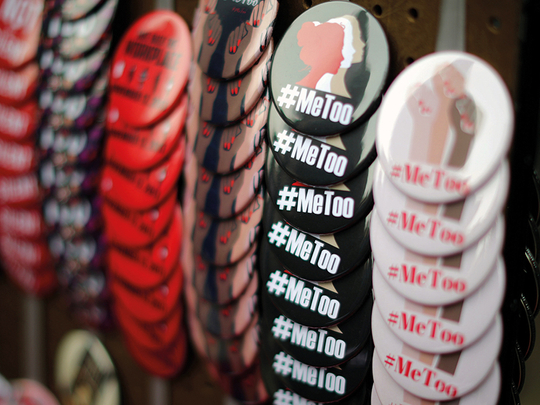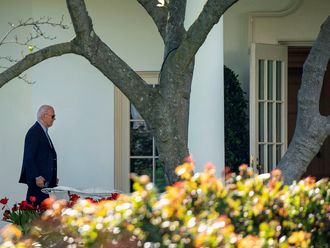
New York: Time’s “Person of the Year” winners are themselves a reminder that power has long been concentrated in the hands of men.
No American woman has won Time magazine’s “Person of the Year” by herself in more than eight decades. Over the course of the 91 years that the magazine has proffered the title, in fact, only one has done so: Wallis Simpson, who earned the title in 1936 thanks to her relationship with King Edward VIII, a relationship which eventually led to his giving up his throne.
In 66 of 89 years, the winner of the title has been a man, by himself. On nine occasions, the winner has been a group of mostly men.
So on Wednesday, when the magazine announced its 2017 winner, The Silence Breakers – a reference to the women (and a few men) who spoke out about sexual harassment, it precipitated a remarkable moment of public accountability for people — almost all men — in positions of power in the country.
German Chancellor Angela Merkel, who was Time’s Person of the Year in 2015, paid tribute to the Silence Breakers and said: “We must thank them for their courage in breaking the silence about sexual assault and for the global discussion they sparked.”
The avalanche of sexual harassment claims began with the epic downfall of Harvey Weinstein, 65. The Hollywood mogul co-founded Miramax, the entertainment powerhouse that catapulted a number of young stars to fame and fortune, including Matt Damon and Ben Affleck. But Weinstein’s empire came crashing down practically overnight when The New York Times released a report alleging numerous allegations of sexual misconduct against Weinstein from dozens of women. It was Charmed actress Rose McGowan who had reached a previously undisclosed settlement with Weinstein in 2007 after an episode in a hotel room during the Sundance Film Festival. In 2016, she tweeted that she was raped by a studio head in 2007, but didn’t identify Weinstein at the time.
Following a social media campaign, numerous other women took the cue, coming out of the shadows to demand justice. Every day, it seems, a new name is added to a growing list of American men – many of them household names in their own right – who are being accused of sexual misconduct from their female colleagues. The actor Kevin Spacey, comedian Louis C.K., journalist Charlie Rose, and NBC host Matt Lauer are just a few of the prominent males from the world of entertainment that have seen their careers ended overnight. In one case that deserves special mention, it has been reported that over 300 women accused filmmaker James Toback of sexual harassment.
World over, a host of celebrities and public figures joined in.
The world of politics, however, was also not spared. Alabama Senate candidate Roy Moore, Congressman John Conyers and Senator Al Franken (D- Minnesota) are all struggling to save their political careers, if not their reputations, following accusations of sexual misconduct brought against them.
Numerous women have spoken out publicly since October about sexual misconduct by dozens of high-profile men in entertainment, media, business and sports. Time praised those who have given “voice to open secrets, for moving whisper networks onto social networks, for pushing us all to stop accepting the unacceptable.” The magazine’s cover features Ashley Judd, Taylor Swift, Susan Fowler and others who say they have been harassed.
Women who spoke out, initially against Weinstein and then others, helped to spawn the #MeToo movement, with millions of people telling stories of sexual misconduct on social media.
The tweets, Instagram and Facebook posts began after actress-activist Alyssa Milano followed on a suggestion from a friend of a friend on Facebook and tweeted: “If you’ve been sexually harassed or assaulted write ‘me too’ as a reply to this tweet.” The hashtag was tweeted nearly a million times in 48 hours. #MeToo was actually founded by activist Tarana Burke a decade ago to raise awareness about sexual violence. Milano has said she wasn’t aware of Burke’s contributions when she made her initial tweet and has since publicly credited her.
Milano and Burke appeared together Wednesday on the “Today” show. “This is just the start. I’ve been saying from the beginning it’s not just a moment, it’s a movement,” Burke said. “Now the work really begins.”
“As women, we have to support each other and stand together and say, ‘That’s it. We’re done. No more,’” Milano said. “It’s vital to me that we really set in some actionable things that we can do to continue this momentum.” Wednesday’s winner differed slightly from how it was described the shortlist of finalists, which mentioned only the #MeToo movement. Time has made such changes before. The 2014 winner, “The Ebola Fighters,” was listed as “Ebola Caregivers” in the shortlist.
The two runners-up for Person of the Year were Chinese President Xi Jinping and President Donald Trump, himself accused of sexual misconduct by numerous women. He has denied any wrongdoing.
Trump, Person of the Year in 2016, tweeted recently that the magazine had told him he “probably” would be named again if he agreed to an interview and photo shoot. Trump added that he “took a pass.” Time has disputed his account.












